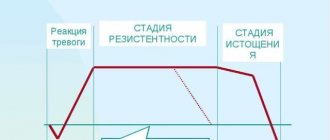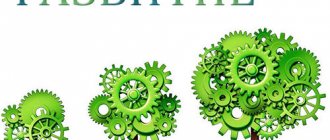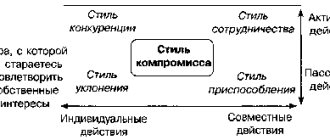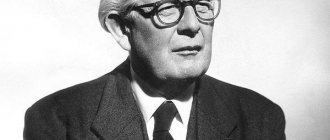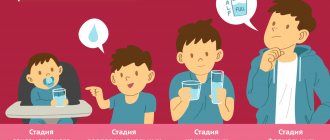The concept of “stress” has become very firmly established in everyday life in recent decades. The term itself refers to emotional dysfunction and tension, which is always accompanied by a negative mood. It came to us from medieval England, where “distress” meant grief or need.
Stress is the body’s ability to adapt to changing living conditions. In the modern rhythm of life, conditions change not only every day, but also every hour. Therefore, we can say with confidence that stressful situations have become commonplace.
By stress we mean a feeling of dissatisfaction, bitterness of loss or seasonal blues, but despite the general symptoms, this phenomenon has several types, subtypes, stages of development and phases. Let's take a closer look at them.
Three stages of stress
G. Selye, a Canadian researcher and doctor, found that every body has the same reaction to stress, based on this pattern, he divided the whole process into 3 phases:
- Anxiety reaction
, in which all the protective functions of the body are mobilized. The body adapts to new conditions of existence. Thanks to the functional integration of organs and vital systems, senses such as memory, attention, touch, and perception are enhanced. The mobilization stage is characterized by the fact that during stress, the degree of thinking increases, options for solving the problem are found, and the person copes with the resulting load. Anxiety stage. - Resistance to imbalance
, when the body adapts to changes, and all parameters that were out of control at stage 1 are normalized. The individual gets used to the new atmosphere, but if it is difficult for the body to quickly adapt, and the resistance continues for a significantly long time, the last phase of stress begins. Resistance stage. - Exhaustion
occurs after unsuccessful attempts at adaptation, when physical strength is lost and the mental state begins to malfunction. This phase is divided into 2 stages.
Selye's stages of stress are clearly illustrated
The exhaustion stage under stress goes through two stages:
- At the stage of the disorder
, there is a decrease in performance, the level of thinking and perception decreases, and it becomes difficult to find a way out of the current circumstances. A person cannot adequately assess the situation and make any decision. This affects the results of work; creative thinking is replaced by simple repetition of action algorithms. If this process affects the management level, then impulsive demands on employees and inappropriate aggressive attacks towards them begin. Exit routes are randomly selected from the list that arose at the first stage of stress. - At the destruction
, all processes are inhibited. The person falls into numbness, it is difficult for him to concentrate on important things, he does not delve into the essence of the conversation, withdraws into himself and is more silent. This type of destruction is called hyperinhibition. This phenomenon can also develop in another “channel”, when a person, unable to find a place for himself, commits rash acts, his activities are disordered. He becomes withdrawn, it is difficult to shout or “reach out” to him. This type of stress is called hyperarousal.
During the exhaustion phase, various diseases appear that affect:
- gastrointestinal tract;
- cardiovascular system;
- mental condition;
- immunity;
- condition of hair, nails and skin.
Benefits from stress
Exposure to mild stressors is somewhat beneficial. Firstly, mild short-term stress helps to activate resources and mobilize to perform a specific task (for example, to pass an exam). Secondly, with each stress, the psyche appears several new activity programs, that is, a person expands and replenishes his behavioral “repertoire” with new ways of interacting with the outside world, and increases self-confidence with each obstacle overcome. The natural need for renewal of emotions is saturated. It is important that the body has enough reserves to adapt.
Classification of stress - types and subtypes
The duration of stress is:
- short-term;
- episodic;
- chronic.
Stress is divided into groups depending on the reasons that provoked its occurrence:
- unfulfilled hopes;
- excitement before competitions;
- lost time;
- changes in life;
- monotony of life;
- the emergence of passivity;
- the unattainability of perfection;
- sudden changes;
- satiety with benefits;
- achieving your goals.
Stress depends on many factors that determine the type of emotional stress. These are everyday conflicts, dissatisfaction with life, salary, position, fear of one’s uselessness to society, lack of time, constant change of time zones, hierarchy of relations between employees and management.
There are many reasons and they are divided into 3 groups:
- manageable stressors;
- stressors undergoing attenuation;
- constant stressors.
14 stages of stress development according to Torsunov:
Help from a psychologist for stress
A psychologist’s help with stress can be used in two ways:
- If any new situation is stressful for you. You often experience a state of causeless anxiety, are depressed, irritable, depressed in the absence of objective reasons. For you, there are a large number of stress factors of psychological origin. Stress is not caused by objective reasons, but by your subjective assessment of what is happening, expectation of the worst consequences, etc. In this case, sessions with a psychologist will help change your assessment of what is happening and reduce the amount of stress of psychological origin.
- Neutralizing the effects of stress. Classes with a psychologist in this direction will help if you have already experienced severe stress , your energy reserves have been depleted, and you feel the need to recover. It is also important to work through and understand the emotional causes of the psychosomatic illness that has arisen in order to prevent its further development.
Amber Center specialists have experience in successfully working with the causes and consequences of stress. After a psychological diagnosis, a psychologist (psychotherapist) will develop an individual training route and, if necessary, give exercises for independent work at home.
Make an appointment with a specialist by calling (812) 642-47-02 or fill out the application form on the website.
Light and dark side
We are accustomed to the fact that stress always has negative consequences, called distress, but there is also a positive side to this phenomenon - eustress:
- Distress
is characterized by an imbalance in the physiological and psychological parameters of the body. It can be short-term and quickly reach the “boiling point”, or it can become chronic and entail failures of all vital systems. - Eustress
can be defined by a surge of joyful emotions and a person’s positive attitude. This happens when he knows about an approaching problem situation, does not know how to solve it, but hopes for a successful outcome. For example, an interview for a well-paid position or entrance exams to an educational institution. Such stress is necessary to solve everyday problems that arise, because it mobilizes all forces for a positive outcome. For example, despite the hated ringing of the alarm clock in the morning, it makes you cheer up and wake up. Eustress, although weak in strength, is beneficial to human health and positions itself as an “awakening reaction.”
Subtypes of distress
The most common subtype of distress is physiological stress. It occurs when external factors influence the human body. If you get burned or hungry, overheated in the sun and pinch your finger, then you cannot do without stressful shocks. At the physiological level, stress is divided into several groups:
- biological
is associated with the occurrence of various diseases; - chemical
stress caused by exposure to chemicals, as well as oxygen starvation or excess oxygen); - physical
is provoked by excessive physical exertion, professional athletes are susceptible to it; - mechanical
occurs in the postoperative period, when complex injuries occur that violate the integrity of tissues or organs.
The next subtype is psychological stress, which is characterized by two types of conflict:
- Dissatisfaction with oneself associated with a discrepancy between expectations and reality
. This conflict most often occurs among people who cannot come to terms with age-related changes in appearance and the body as a whole. - Stressful state due to social conflicts within a social unit
. For example, intra-family conflicts, quarrels with friends or colleagues.
Emotional stress occurs when a person is exposed to an emotional stimulus. Conflicts become such irritants when a person cannot satisfy biological or sociocultural needs for a long time.
For example, a strong resentment towards a loved one, deception, as well as information overload, which usually occurs when preparing for exams or submitting annual reports. Over the course of many years of research, it has become clear that stress is individual for each person and leads to different consequences.
Interestingly, people with increased stress tolerance quickly cope with extreme situations. Those whose indicator is underestimated may encounter neuroses, high blood pressure, and disruption of the vital systems of the body. What will suffer the most depends on individual characteristics and the presence of chronic diseases, because the load mainly falls on the weakest link.
Causes
The main reason is the situations that provoke it, they are called stress factors. Considering that the life of a modern person is dynamic and unpredictable, there are a great many reasons. Constant troubles, misunderstandings with loved ones, pressing stress at work, breakdowns of household appliances or cars, and just everyday worries. All this provokes irritation and anxiety.
Sometimes the lack of change, routine and “Groundhog Day” can be the main reason. Each person has their own individual mental characteristics, which for one is an annoying nuisance, for another a cause of stress.
Causes
Main reasons
- conflicts with family and friends;
- unemployment and debt;
- overwork, lack of vacation;
- chronic diseases and excess weight
- dissatisfaction with oneself and one's appearance
Stress develops at three levels: biochemical, psychological and physiological.
When a person finds himself in a stressful situation, his blood glucose level rises, blood pressure rises, the heartbeat becomes more frequent, the deposition of fatty tissue in the subcutaneous tissue increases, sodium is retained, and with it water in the tissues, and potassium, which is necessary for the functioning of the heart and nerves, is eliminated faster than necessary.
Types of people in stressful situations
Each person reacts to sources of stress individually; each phase can last longer or shorter for different people. This depends on a person’s resistance to stress, on his ability to quickly “bend under” the situation and find the right solution to solve the problem.
Experts have found that there are different reactions to stress and have identified 3 types of people:
- those who can withstand stress for a long time
, while being in excellent shape and in an adequate mental state; - those who, when a problem arises, lose their ability to work
, it is difficult for them to find a solution and adapt to new conditions; - those who can work productively and show high results only under stress
, problems “spur them on” and force them to move forward.
Ways to get out of stress
You can get out of stress on your own, it is only important to find a suitable way. The most important thing is to bring bright colors into your life, improve your mood, and learn to think positively. Even in a negative situation, you can see the benefits if you want.
Healthy lifestyle
It is necessary to build the correct day and night routine. Meals should be complete and on time. Moderate physical activity, sports and healthy family relationships will only help overcome stress. Don't overwork yourself at work and at home.
Vitamins
Overcoming stress is possible for everyone. It is important that the body receives all the necessary vitamins and microelements. You can buy pharmaceutical complexes, and also eat fruits and vegetables rich in vitamins. In a healthy body, protective functions work perfectly. The psyche and internal systems are not so susceptible to stress.
Rest
Rational rest helps relieve stress and restore. You can’t work too hard, because psychological fatigue is added to physical fatigue. And this is already fraught with stress. During rest, you should not think about work, but while at work, you should not think about home. The ability to switch will help avoid stress.
Full sleep
Nothing restores the body better than healthy, full sleep. During sleep, the body produces hormones responsible for growth and restoration of functions. Therefore, you should try to go to bed before 23-00 in order to get enough sleep and wake up cheerful and in a good mood.
Hobbies
When a person does what he loves, he experiences joy and satisfaction. Any hobby may take time, but it has a beneficial effect on a person’s mental state. This helps to get rid of problems and forget all the bad things for a while. A rested brain will quickly tell you how to cope with negativity.
Physical exercise
Regular physical activity will help release excess adrenaline and help the body relax. Exercising in the fresh air will help normalize breathing and enrich internal organs with oxygen. A morning jog in nature will have a positive effect on your mood, and happiness hormones will begin to be produced.
Aromatherapy, dancing, music
The healing power of aromatic oils has been known since ancient times. They can be added to the bath, applied to the body, or used as an air freshener. When essential oils enter the body, they cause a surge of good mood and euphoria, and calm the nervous system. Dancing and pleasant, soothing music, such as classical, have the same effect on a person.
Comparison
Let us draw some conclusions from the above definitions. Stress is the body's reaction to negative emotions. Its impact provokes a surge of adrenaline, mobilization of thought processes in order to find a way out of the situation. However, if it is not possible to find a solution to the problem, a period of exhaustion of the body begins, which becomes the initial stage of depression. The latter, in turn, leads to a decline in vitality, impaired thinking and motor retardation. Thus, stress mobilizes the body, making it even beneficial for health in moderate quantities. Depression, on the contrary, drains all the “juices” from a person, making him sick and weak.
It is worth noting that stress is short-term. That is, the processes of excitation provoked by a negative situation pass quite quickly. But the period of its experience lasts three times longer than the impact itself. Typically, the average duration of mild depression is a couple of weeks. Whereas serious traumatic situations for a person plunge him into an apathetic state for several months, or even years. This is another difference between stress and depression. While the individual is often able to overcome the first state on his own, the second requires outside intervention. Sometimes close people help bring a person out of depression, supporting him in every possible way and encouraging him to be active. However, if all the steps taken by the environment turn out to be useless, you have to seek help from a specialist. Consultations with a psychotherapist along with taking medications make it possible to overcome the disease.
To summarize, what is the difference between stress and depression.
Diagnosis and treatment of stress at Expert Clinics
Expert Clinics is a European-level clinic in Moscow, which fundamentally and comprehensively deals with the diagnosis and treatment of stress, as well as its consequences.
First of all, you should make an appointment. Next, based on the patient’s complaints, a treatment plan is prescribed.
It is important to understand that stress is not cured with one or two visits to the doctor. Recovery occurs in stages. It is important that this path becomes conscious for you. And correct and timely diagnosis of stress will be an important step towards a happy life.
Sign up
But do we know what stress is?
Stress is a human condition that occurs as a reaction to any events or demands that are difficult or impossible for a person to cope with.
How to get pleasure hormones
Many people think that the most vivid sensations come from alcohol and drugs, but in fact there are many ways to get your own, natural “pleasure hormones.”
Psychologists differentiate stress by power.
Great stress
occurs in response to situations that pose a threat to life or its usual way of life: natural or man-made disasters, war, captivity.
Significant personal events can be the cause of great stress: the death or serious illness of a loved one, divorce, major financial losses, forced migration or job loss. Low stress
can be caused by a wide variety of everyday situations and problems that a person cannot solve or requires special effort to do so. Such stress should not be underestimated, because if a person experiences stress of low intensity for a long time, then the harm to his health can be comparable to the effects of severe stress.
What is a plus, what is a minus?
Science divides stress into two types: distress and eustress. The first one is negative, the second one is positive. This difference is best seen with a simple example. Is divorce stressful? Of course, a very difficult psychological situation. What about the wedding? Well, no, of course, this is joy, happiness! But it turns out that this event is also stressful. Only with a plus sign.
In theory, all stress is of the same nature. Under the influence of traumatic situations, the body tenses up and turns on its protective and adaptation mechanisms. So from a physiological point of view, we react to both “good” and “bad” stress in almost the same way. Although there is a difference - in at least two things. Firstly, in the emotional “accompaniment” of this or that experience, and secondly, in its duration and intensity.
Happinnes exists! What products will lift your mood Read more
How is stress tolerated and why is it dangerous?
How serious stress and its consequences
for human health will be depends both on the intensity and duration of the stress, and on the psychological and genetic characteristics of the person.
Not all people who experience comparable levels of stress suffer from it in the same way. The consequences of stress are also influenced by a person’s living conditions and his environment. If you have family, loved ones, friends, stress is easier to bear
.
Stress of great intensity or long-term chronic stress can contribute to the development and progression of both physical and mental
diseases. Stress usually contributes to the “failure” of the most weakened systems of the body. Hypertension, coronary heart disease, bronchial asthma, peptic ulcer disease - this is not a complete list of diseases, the development of which can be accelerated by severe or prolonged stress. We should not forget about serious mental problems - such as anxiety, neurotic or depressive disorders, which also significantly reduce a person’s quality of life.
Table
| Stress | Depression |
| The body's reaction to negative emotions | Mental disorder |
| Its effect provokes a surge of adrenaline, mobilization of thought processes | Accompanied by a decline in vitality and impaired thinking |
| Healthy in moderation | Makes a person sick and weak |
| Is of a short-term nature | Can be protracted, can last several years |
| Often overcome independently by a person | Often requires treatment and professional intervention |
